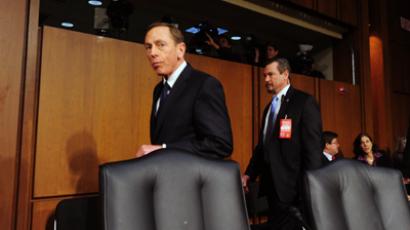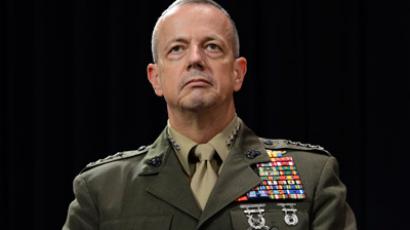US intelligence specialist: Petraeus put US lives at risk with PC war doctrine
Lieutenant Colonel John L. Cook was once a top counter-insurgency specialist trusted with the most sensitive missions, but his latest book, Afghanistan: The Perfect Failure, has turned him into the bête noir of the US military establishment.
Cook began his intelligence career in Vietnam, and his last assignment was four years in Afghanistan, where he oversaw the creation of the new local police force, until retiring in August this year.While there he says he witnessed a new “politically correct” way of fighting that was meant to put a premium on the lives of local civilians, but instead paralyzed US soldiers and goaded the Taliban into ever more brazen operations. He also says that the Afghans’ lack of trust in their government means that US can never hope to win their hearts by supporting handpicked leaders in Kabul.He lays much of the blame for US failures at the feet of General David Petraeus, who headed the US forces, first from Washington, and then directly on the ground, and established the rules of engagement.
RT: You do say in your book, that Petraeus shouldn’t have resigned over the extramarital affair, he should have resigned over the way he handled Afghanistan”. Why? Can you explain that?John Cook: First of all, thank you for having me on. I spent four-and-a- half years in Afghanistan where I was a senior adviser for the Ministry of the Interior. And out of that came my latest book Afghanistan: The Perfect Failure. This book was published in September. It was before the Petraeus-Broadwell affair. However, I am very critical of General Petraeus because he should have resigned, when his counter insurgency strategy failed to produce results. And here’s the real problem with that. His counter-insurgency strategy, which he wrote (he cannot deny that) places a higher premium on the lives of Afghan civilians then our own soldiers. As a result, our soldiers are forced to take more and more risks in an effort to win the Afghan civilians to the side of the government. In theory it’s not bad to try to win the hearts and minds (that’s always a good thing in a counter-insurgency strategy). But the fatal flaw in his strategy in Afghanistan is that the average Afghan civilian fears the Afghan government more than they do the Taliban. And that explains why after 11 years have made no significant progress against the Taliban, because the people distrust the government. That’s the fundamental problem. RT: This policy found some success in Iraq. Yet you say that mistake was responsible for the deaths of many US soldiers in Afghanistan?JC: The problem is that I recognize Iraq is an entirely different theatre than Afghanistan. And as a result my focus was only on Afghanistan. And while we may have had certain success in Iraq, it does not automatically translate that you can do the same thing in Afghanistan. Afghanistan has an entirely different flavour than Iraq. First of all, Iraq was basically a conflict between Sunni and Shia. In Afghanistan you have any number of tribes that break along all kinds of different lines. Iraq had a more stable government and was more developed than Afghanistan. Afghanistan was pretty much in a shambles. So, any comparison you draw between those two is suspect and that’s why I focus only on Afghanistan.
RT: What about the military surge operation? Was that not a success inspired by Petraeus? JC: The problem with the surge (you are talking about the surge) we started it early in 2010, where we injected 30,000 more soldiers into that conflict. The problem was that the surge simply put more people in combat and put more people at risk due to his failed counter-insurgency strategy. So the reality is in Afghanistan the surge produced nothing more than more American casualties. And so, instead of changing the strategy the leadership simply doubled down on a failed policy. That’s my big complaint with Afghanistan.RT: You are highly critical of Petraeus. What do you make of the timing of this affair and the consequences that affected his career? Is there a feeling within Washington, that he was a failure and that something had to be done about it?JC: I try very hard not to speculate about things that I don’t have direct knowledge of. I realize there is a lot of discussion going on, that the timing was suspect, and that it was all done for political purposes. We still have the unanswered questions surrounding the Benghazi issue, but as far as his relationship with Ms Broadwell… I understand that, but I give them much lower marks for his actions in combat, than I do in the bedroom. First of all, he was hired to win a war, pure and simple. And he didn’t do that.RT: But he is still being championed as a military hero. Clearly you’ve got very strong reasons for writing this book. Do you worry about public sentiment turning against you for writing this very critical book of Petraeus. What really motivated you? JC: It doesn’t bother me to go against public sentiment, because we sometimes take military leaders and build a very nice resume for them and it catches on and everybody starts drinking from the same well. I hold our military commanders to a very high standard. Look, we put young men at risk and they give it everything they’ve got and if the policy is failed… We have young men in schools right now all over this country that will die in Afghanistan next Summer for no other reason than propping up a corrupt interlocking criminal enterprise, which is what the Karzai government has become. That’s my real problem with it. I was a soldier for over 20 years. So I care deeply about those young men and women.














